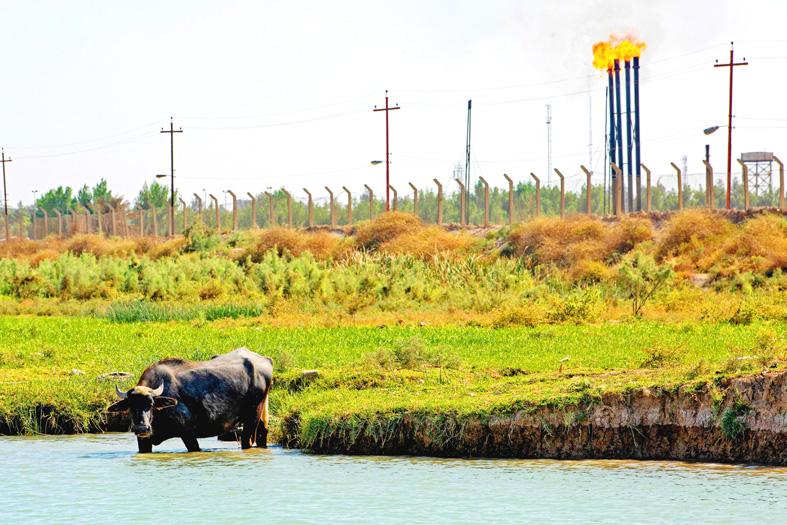Oil pared its weekly loss as Saudi Arabia cranked up prices for its global crude exports and the US demurred on a potential release of oil from the strategic reserve.
West Texas Intermediate (WTI) shaved its weekly loss to 2.75 percent, rising sharply late in the session on Friday, after Saudi Arabia raised the official selling price of all the nation’s crudes to buyers around the globe.
WTI for December delivery on Friday rose 3.12 percent to US$81.27 a barrel, while Brent crude for December delivery rose 2.73 percent to US$82.74 a barrel, declining 1.17 percent from a week earlier.

Photo: AFP
Saudi Arabia boosted its prices just days after refusing to concede to US pressure to pump more oil.
With the OPEC+ cartel unanimously agreeing to stick to its plans, attention now turns to whether US President Joe Biden will respond.
“The key focus for the market right now remains the US’ response to the OPEC+ meeting yesterday,” said Rebecca Babin, senior energy trader at CIBC Private Wealth Management.
The increase in Saudi Arabian Oil Co prices suggests Saudi Arabia sees demand still improving, particularly in Asia where a resurgence in COVID-19 cases seeded doubt about the recovery’s strength, she added.
Oil has rallied to multiyear highs this year as major economies, including the US and China, recover from the COVID-19 pandemic, with BP PLC estimating global demand has rebounded above the pre-COVID-19 level of 100 million barrels a day.
A global energy crunch due to coal and natural gas shortages has exacerbated the tightness in the oil market and increased inflationary pressures in the US, prompting the Biden administration to seek ways to lower fuel costs.
Earlier on Friday, US Secretary of Energy Jennifer Granholm said that Washington is looking at a potential release from the Strategic Petroleum Reserve. Japan said it is in close contact with the US and the International Energy Agency as pressure from consumers grows.
For months, Biden has led calls for OPEC+ to add more barrels to tame high oil prices. The US was seeking an increase of as much as double the amount that was agreed, and has been among key consumers that previously raised the prospect of tapping their own strategic reserves if the alliance did not cooperate.
“Oil is not the problem,” Saudi Arabian Minister of Energy Prince Abdulaziz bin Salman said after the OPEC+ meeting on Thursday, citing natural gas shortages. “The problem is the energy complex is going through havoc and hell.”
Additional reporting by staff writer

In Italy’s storied gold-making hubs, jewelers are reworking their designs to trim gold content as they race to blunt the effect of record prices and appeal to shoppers watching their budgets. Gold prices hit a record high on Thursday, surging near US$5,600 an ounce, more than double a year ago as geopolitical concerns and jitters over trade pushed investors toward the safe-haven asset. The rally is putting undue pressure on small artisans as they face mounting demands from customers, including international brands, to produce cheaper items, from signature pieces to wedding rings, according to interviews with four independent jewelers in Italy’s main

Macronix International Co (旺宏), the world’s biggest NOR flash memory supplier, yesterday said it would spend NT$22 billion (US$699.1 million) on capacity expansion this year to increase its production of mid-to-low-density memory chips as the world’s major memorychip suppliers are phasing out the market. The company said its planned capital expenditures are about 11 times higher than the NT$1.8 billion it spent on new facilities and equipment last year. A majority of this year’s outlay would be allocated to step up capacity of multi-level cell (MLC) NAND flash memory chips, which are used in embedded multimedia cards (eMMC), a managed

Japanese Prime Minister Sanae Takaichi has talked up the benefits of a weaker yen in a campaign speech, adopting a tone at odds with her finance ministry, which has refused to rule out any options to counter excessive foreign exchange volatility. Takaichi later softened her stance, saying she did not have a preference for the yen’s direction. “People say the weak yen is bad right now, but for export industries, it’s a major opportunity,” Takaichi said on Saturday at a rally for Liberal Democratic Party candidate Daishiro Yamagiwa in Kanagawa Prefecture ahead of a snap election on Sunday. “Whether it’s selling food or

In the wake of strong global demand for AI applications, Taiwan’s export-oriented economy accelerated with the composite index of economic indicators flashing the first “red” light in December for one year, indicating the economy is in booming mode, the National Development Council (NDC) said yesterday. Moreover, the index of leading indicators, which gauges the potential state of the economy over the next six months, also moved higher in December amid growing optimism over the outlook, the NDC said. In December, the index of economic indicators rose one point from a month earlier to 38, at the lower end of the “red” light.